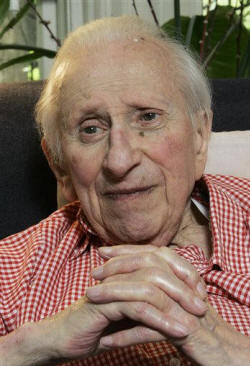|
 Author, activist Studs Terkel dies at 96 Author, activist Studs Terkel dies at 96
 Send a link to a friend
Send a link to a friend
[November 01, 2008]
CHICAGO (AP) --
Studs Terkel captured the essence of Chicago in the pages of his best-selling oral histories, chronicling common people and celebrities alike.
Along the way he became an ageless master of listening and speaking, a broadcaster, activist and Pulitzer Prize-winning author. Terkel died Friday at age 96.
"He found his home in Chicago and he found it in the gritty aspect of Chicago life," said Russell Lewis, chief historian at the Chicago History Museum. "The ne'er-do-wells, the outcasts, the bums, all these people were people he was curious about. They intrigued him."
|
|
 Dan Terkell said his father died at home, and described his death as "peaceful, no agony. This is what he wanted." Dan Terkell said his father died at home, and described his death as "peaceful, no agony. This is what he wanted."
"My dad led a long, full, eventful, sometimes tempestuous, but very satisfying life," Terkell, who spells his name with an extra letter, said in a statement issued through his father's colleague and close friend Thom Clark.
Terkel was a native New Yorker who moved to Chicago as a child and came to embrace and embody his adopted town, with all its "carbuncles and warts," as he recalled in his 2007 memoir, "Touch and Go." He was a cigar and martini man, white-haired and elegantly rumpled in his trademark red-checkered shirts, an old rebel who never mellowed, never retired, never forgot, and "never met a picket line or petition I didn't like."
"A lot of people feel, 'What can I do, (it's) hopeless,'" Terkel told The Associated Press in 2003. "Well, through all these years there have been the people I'm talking about, whom we call activists ... who give us hope and through them we have hope."

The tougher the subject, the harder Terkel took it on. He put out an oral history collection on race relations in 1992 called "Race: How Blacks and Whites Think and Feel About The American Obsession," and, in 1995, "Coming of Age," recollections of men and women 70 and older.
He cared about what divided us, and what united us: death - in his 2001 "Will the Circle Be Unbroken? Reflections on Death, Rebirth, and Hunger for a Faith," and hope, in his 2003 "Hope Dies Last."
Terkel won a 1985 Pulitzer Prize for "The Good War," remembrances of World War II; contrasted rich and poor along the same Chicago street in "Division Street: America," 1966; limned the Depression in "Hard Times," 1970; and chronicled how people feel about their jobs in "Working," 1974.
Said Andre Schiffrin, Terkel's longtime editor, publisher and close friend: "He liked to tell the story of an interview with a woman in a public housing unit in Chicago. At the end of the interview, the woman said, `My goodness, I didn't know I felt that way.' That was his genius."
He also was a syndicated radio talk show host, voice of gangsters on old radio soaps, jazz critic, actor in the 1988 film "Eight Men Out," and survivor of the 1950s blacklist.
Terkel's politics were liberal, vintage FDR. He would never forget the many New Deal programs from the Great Depression and worried that the country suffered from "a national Alzheimer's disease" that made government the perceived enemy.
Terkel was born Louis Terkel on May 16, 1912, in the Bronx. His father, Samuel, was a tailor; his mother, Anna, a seamstress. The family moved to Chicago in 1922 and ran a rooming house where young Louis would meet the workers and activists who would profoundly influence his view of the world.
He got the nickname Studs as a young man, from the character Studs Lonigan, the protagonist of James T. Farrell's beloved trilogy of novels about an Irish-American youth from Chicago's South Side.
[to top of second column] |
 Terkel graduated from the University of Chicago in 1932, studying philosophy, and also picked up a law degree. But instead of choosing law, he worked briefly in the civil service and then found employment in radio with one of his beloved "alphabet agencies" from the New Deal, the WPA Writers Project.
His early work as a stage actor led to radio acting, disc jockey jobs and then to radio interview shows beginning in the 1940s. From 1949 to 1952, he was the star of a national TV show, "Studs' Place," a program of largely improvised stories and songs set in a fictional bar (later a restaurant) owned by Studs. Some viewers even thought it was a real place and would go looking for it in Chicago.
The McCarthy-era antipathy toward activists cost him his national TV outlet. But his radio interview show flourished, first at WFMT in Chicago and then, through syndication, in many markets.
Alton Miller, an associate dean of the School of Media Arts at Columbia College Chicago and a friend of Terkel's for more than 20 years, said Terkel hoped to live to see Barack Obama elected president.
Obama called Terkel a Chicago institution and national treasure.
"His writings, broadcasts, and interviews shed light on what it meant to be an American in the 20th century," Obama said in a statement Friday night. "He will be deeply missed by all who knew him, all who loved him, and all whose lives were enriched by the American stories he told."

In 1939, he married social worker Ida Goldberg, a marriage that lasted 60 years even though she couldn't get him to dance and always called him Louis, not Studs. "Ida was a far better person than I, that's the reality of it," Terkel later wrote of Ida, who died in 1999.
"She had a certain empathy I lack. And she was more politically active than I. ... Did she play a tremendous role in my life? Yeah, you could say so."
---
Associated Press National Writer Hillel Italie and reporters Don Babwin and Michael Tarm in Chicago contributed to this report .
---
On the Net:
http://www.studsterkel.org/
[Associated
Press; By CARYN ROUSSEAU]
Copyright 2008 The Associated
Press. All rights reserved. This material may not be published,
broadcast, rewritten or redistributed. |